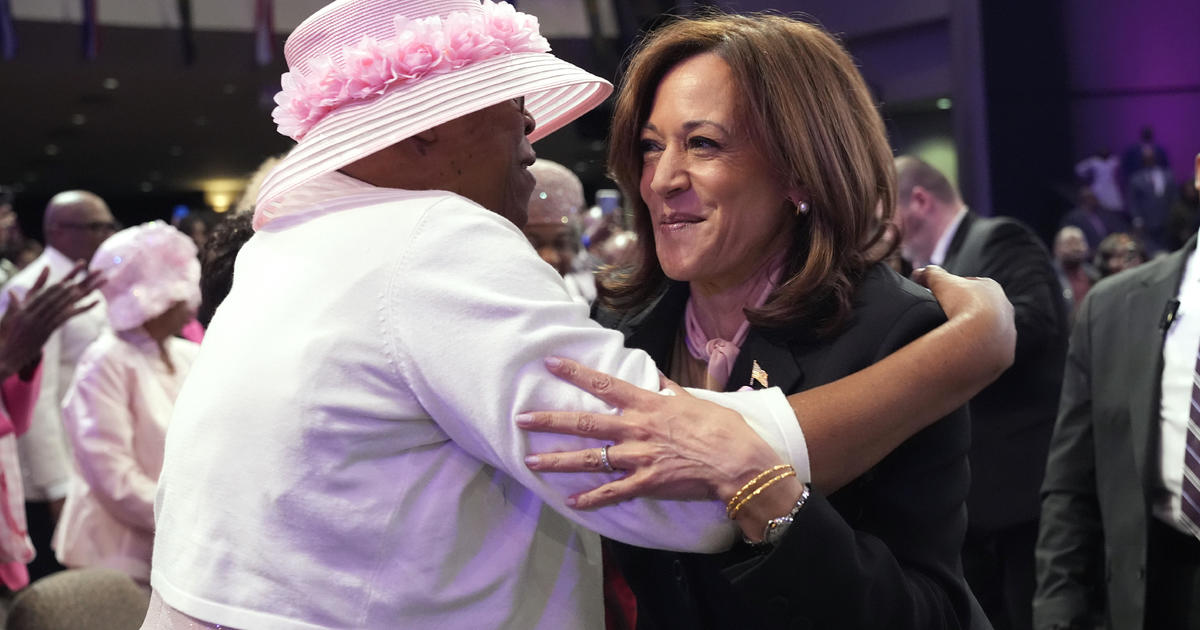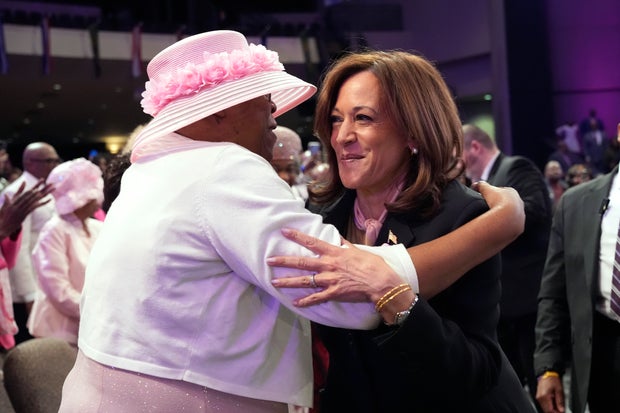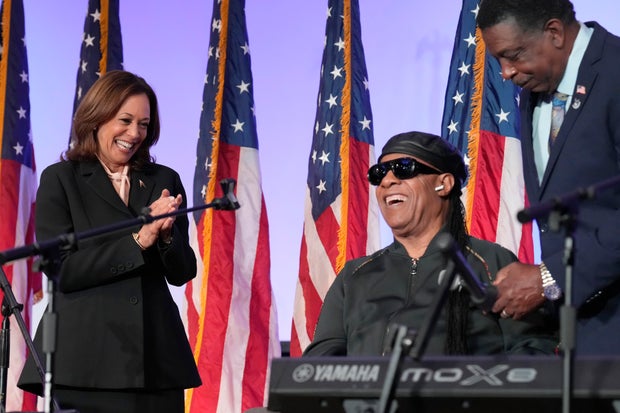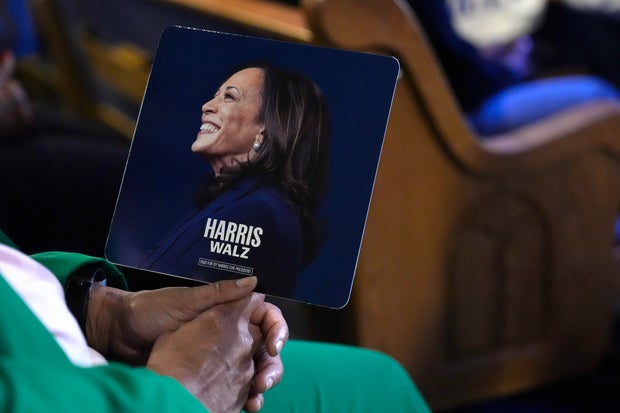Atlanta – Reva Harvey didn’t know Vice President Kamala Harris would be coming to her church on Sunday. But with almost two weeks left until Nov. 5, she thought it was “essential” for her to do so.
Harvey, a 53-year-old Black woman whose birthday was one day before Harris’, said the vice president’s visit to the New Birth Baptist Church in Stonecrest, Georgia, could help her find older Black voters and give them “the information that they need.”
“You need to hit every corner, turn every song, just to be safe,” Harvey said at Harris’ Saturday rally in Atlanta.
Harris, a Baptist, capped off a week of heightened outreach to Black voters with visits last Sunday to two churches in the Atlanta area. Her focus underscores the importance for her in activating and persuading Black voters, the core of her party’s electorate, by going to a stronghold within the community.
Jacquelyn Martin / AP
At a CNN town hall on Wednesday night, Harris highlighted her faith, saying she prays “every day, sometimes twice a day.”
“I was raised to believe in a loving God, to believe that your faith is a verb,” Harris said. “You know, you live your faith. And that, that the way that one should do that is that your work and your life’s work should be to think about how you can serve in a way, uplifting other people. “
She said one of the first phone calls she made after President Biden told her was dropping out of the presidential race was to her pastor. She said she “needed that spiritual kind of connection.”
Georgia Sen. Raphael Warnock, during an appearance at a Jonesboro, Georgia, church with Harris, threw cold water on the idea Trump was siphoning off Black male support away from Harris, and got the men in the crowd to stand up and chant “real men vote.”
“This talk about Black men voting for the other… you know what I’m talking about. I don’t believe it,” said Warnock, who added “the real threat is not Trump, but not showing up.”
In recent weekends, Harris has attended multiple Black church services in southern battleground states.
At the New Birth Baptist Church, Harris referenced the Gospel of Luke in reciting the “Parable of the Good Samaritan” and saying that first responders and those helping recovery efforts from Hurricane Helene and Milton represent “the good Samaritans walking among us.”
Later, at a “Souls to the Polls” event at the Divine Faith Ministries in Jonesboro, Georgia, Harris was joined by music legend Stevie Wonder and Warnock, a senior pastor at Ebenezer Baptist Church.
“This is an afternoon about faith and action,” Harris told the crowd, referencing the “Souls to the Polls” month-long mobilization of Black voters that launched last Sunday.
Jacquelyn Martin / AP
The campaign has a National Advisory Board of Black Faith Leaders leading this effort through surrogate appearances in battleground states, including Harris’ own pastor, Reverend Amos C. Brown from San Francisco.
“It takes a real man to support a woman, who are not intimidated by an educated woman,” said Jamal Bryant, the senior pastor at the New Birth Baptist Church, as Harris sat in the congregation.
Black male voter outreach
Recent CBS News polling of the battleground states shows Harris’ support with Black voters is equal to levels President Joe Biden saw in a 2020 exit poll. But a higher number of Black men (19%) said they are supporting former President Donald Trump, compared to Black women (7%).
Former President Barack Obama, who made history as the first Black president and has been on the trail for Harris in recent weeks, used a sobering tone to address Black men in Pennsylvania earlier this month.
“You’re coming up with all kinds of reasons and excuses,” Obama said. “Part of it makes me think that, well, you just aren’t feeling the idea of having a woman as president.”
Recent weeks saw a heightened focus from the Harris campaign to target Black men. Last Monday, Harris released a new policy plan that was a direct appeal to Black male voters. It included a National Health Equity Initiative to focus on illnesses disproportionately impacting Black men, the legalization of marijuana and creating opportunities for Black Americans in the field, and providing up to 1 million forgivable loans up to $20,000 for Black entrepreneurs.
When asked to compare the enthusiasm behind Harris’ campaign and Obama’s 2008 run, Harvey said while there is excitement and energy for Harris, “it’s not as hype” as she wants it to be, in part because some voters are reluctant on Harris because of her gender.
In a MSNBC interview with Rev. Al Sharpton, Harris pointed to her Atlanta rally of over 10,000 as evidence of her support from Black men, but said, “I am very clear I must earn the vote of everyone, regardless of their race or gender.”
“What can be frustrating sometimes is to have journalists ask me this question, as though one should assume that I would just be able to take for granted the vote of Black men. I think that’s actually an uninformed perspective, because why would Black men be any different than any other demographic of voter? They expect that you earn their vote,” she said.
Harris’ running mate, Minnesota Gov. Tim Walz, touted the campaign’s proposed policies meant to help the middle class when asked what his message is to Black men in Philadelphia.
“I think we need to make sure we’re getting out to them. We hear what they’re saying. We understand that their concern with issues, whether it’s climate, or health care, or reproductive rights, men care about that too,” Walz told Philadelphia’s 6ABC.
The Harris campaign has long contended that Black and Latino voters have remained as “persuadable” voter targets throughout the entire race, citing early investment in Black-specific advertising.
Jacquelyn Martin / AP
Harris has also done several interviews this month with Black male journalists on platforms with predominantly Black audiences in recent days such as a Detroit radio town hall with “The Breakfast Club” and host Charlamagne tha God, with “The Shade Room” and journalist Roland Martin’s “Black Star Network.”
Black Democratic operatives say these appearances may be as effective, if not more, in convincing undecided Black voters than specific policy plans.
It is helpful to be in the spaces and to be with validators that are not of government or of the institutions,” said Democratic strategist Joel Payne, who added that many young Black male voters who are undecided may have an already existing distrust with government. “You gotta flood the zone, and I think that’s what they’re trying to do.”
Payne viewed the Harris campaign’s targeting of Black voters as recognition they need to maintain high turnout in cities with high Black populations, such as Detroit, Milwaukee and Philadelphia, as well as with Black rural voters in Georgia and North Carolina.
“They would not be doing that three weeks before Election Day if they didn’t feel like they needed to,” he added.
Quentin James, the president of the “Collective PAC” which boosts Black candidates, praised Harris’ policy proposals and argued it’s not “too little too late” for Harris to be looking to persuade Black voters.
“The question is like, ‘What will people have her do? Act as if the vote is not important, and just kind of sit back and cruise? No, she’s out working, and that’s not a sign that things are bad,” James said.




